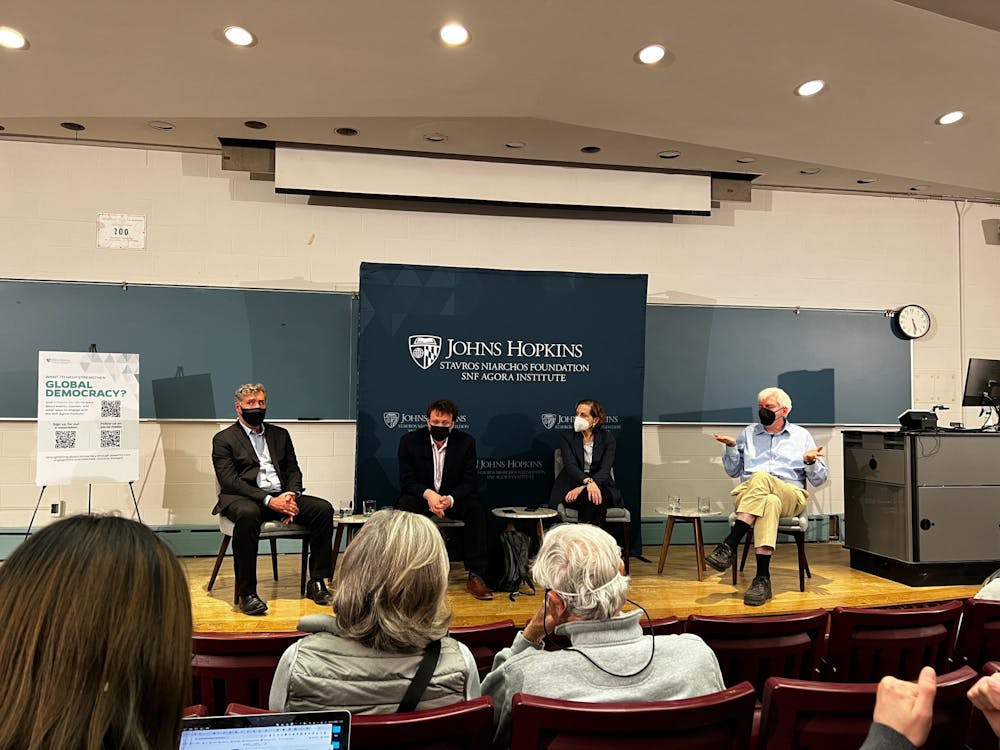The Stavros Niarchos Foundation (SNF) Agora Institute held a pop-up talk focused on the Russian Federation’s invasion of Ukraine on March 3. The conversation was led by SNF Agora Senior Fellows Anne Applebaum and Peter Pomerantsev, SNF Agora Institute Professor of International Affairs Henry Farrell and Desmond M. Tutu Professor of Public Health and Human Rights Chris Beyrer from the School of Public Health.
Applebaum explained the origins of the war and Vladimir Putin’s role in the geopolitical crisis. She stated that this conflict has been a long time in the making and can be traced back to the collapse of the Soviet Union and the Berlin Wall.
“This moment, one that many of us saw as a great moment of liberation and freedom, was, for Putin, the end of an era and a great tragedy,” she said.
She noted Ukraine’s role in this conflict, discussing the country’s dual significance as the second largest republic in the Soviet Union and the bridge between Russia and Europe. She added that, in addition to Ukraine’s role as a former colony of Russia, the country’s three-decade-long fight for independence and a Western-style democracy is a movement that directly challenges what Putin is using to rule Russia.
Pomerantsev discussed the language that Putin has been using to justify this conflict. He explained how the language Putin uses to talk about Ukrainians is reminiscent of Nazi propaganda.
“The Nazis had invented a language which defined social categories to define who was deserving and undeserving of life,” he said. “Putin has very explicitly used the same categories about the Ukrainians.”
Pomerantsev highlighted how there is another aspect to Putin’s rhetoric in that it is not just about Ukraine but also about the United States. He explained that Putin sees the U.S. as the ideal, a country that Putin seeks respect from but will never gain. He discussed how Putin’s great defeats in life were due to victories of democracy which were, in some ways, led by the United States.
Along with retelling the course of this war, Chris Beyrer focused on the public health crises occurring amid this ongoing conflict. He brought up Putin’s strategy of attacking public health facilities and health-care workers in Ukraine and the role of COVID-19 as crowds of people are fleeing war.
“There have been at least now 24 documented attacks on hospitals including a maternity hospital, blood donation center and an oncology center,” he said. “These are war crimes and an atrocity, and Putin needs to be held accountable for these war crimes.”
Freshman Carlos Gamboa noted that the event provided a good opportunity to learn about the history and origins of this war, noting that listening to expert opinions allowed for a greater understanding of this crisis in an interview with The News-Letter.
Gamboa also explained how this event provided a viewpoint on the public health crisis unfolding in Ukraine, which made him reflect on the University’s role in the ongoing conflict.
“Hopkins should recognize how this can be a COVID-19 crisis in Europe,” he said. “Although the University can’t resolve this public health emergency, it can at least, as a leader in public health, make an effort to address it.”
Beyrer noted that Ukraine and its neighbors have had problems with low vaccination rates and coverage because of vaccine hesitancy. He expressed concern about thousands of people moving together into other countries with low vaccine coverage and ongoing COVID-19 surges.
“This is already a public health crisis and humanitarian crisis that will only be exacerbated by COVID-19,” he said. “These attacks on health care are a fundamental feature in the attempt to terrorize civilian populations, something that Putin has done in Syria and is now aggressively doing in Ukraine.”
When asked about how to respond to reactionary social messages and the role of others in fighting Russian propaganda, Beyrer discussed the importance of coalitions and street protests.
Farrell explored the economic response and networks that have been used to try and isolate Russia from the world economy.
“Many tactics are trying to identify choke points in the world economy and then utilize them to cut Russia out of the system in case Russia attempts to engage in global trade or global finance,” he said.
Farrell explained how the sanctions and tactics of pressure that have been employed, such as the freezing of the assets of the Central Bank of the Russian Federation, has had negative consequences for Russian currency.
Sophomore Hélène Girard stated that this event provided a range of viewpoints in an interview with The News-Letter.
“I appreciated the Ukrainian-based history, the general politics, the health-care aspect and the business policy,” she said. “I didn’t know the full background history, so I found that this event gave a nice platform off of which I can research things further.”

















